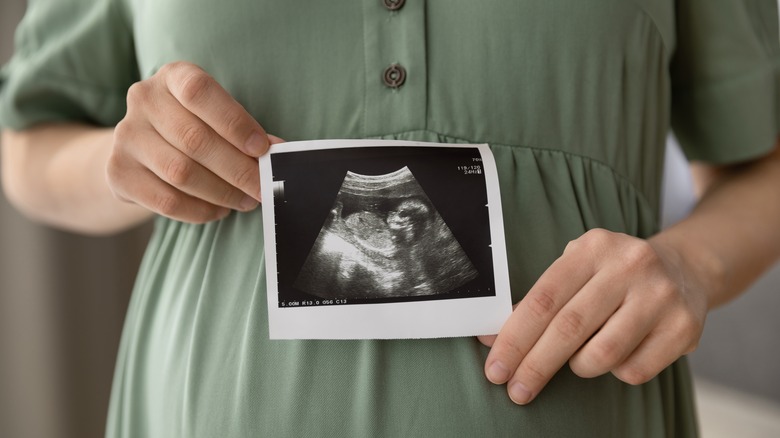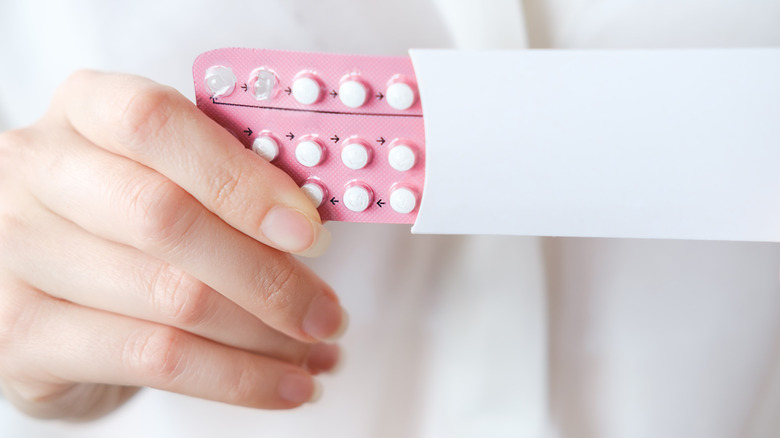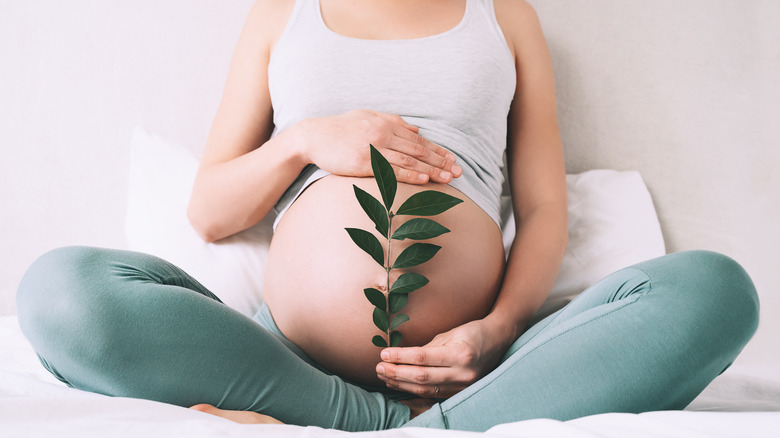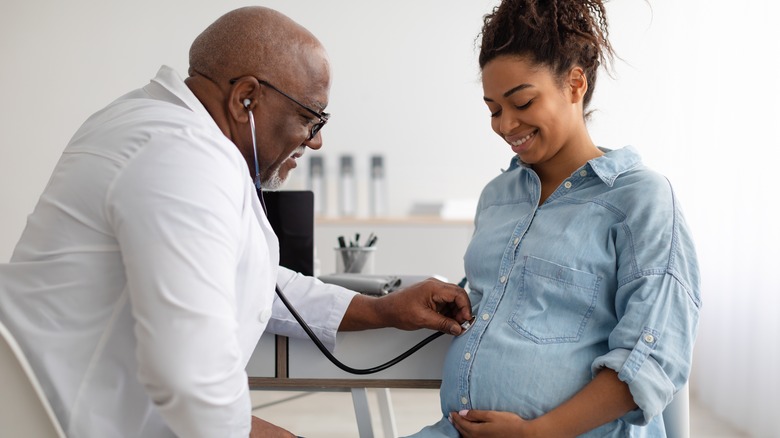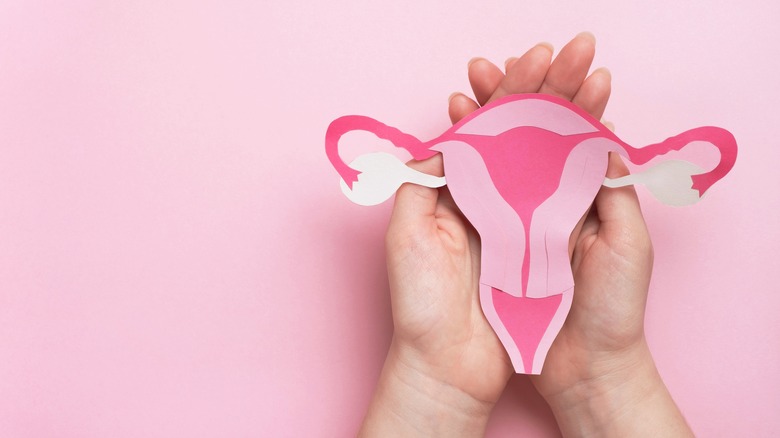Myths You Should Stop Believing About Women's Health
We live in an age of misinformation. These days, you can Google just about any theory and you will most likely find someone who has already written a very convincing article about its validity. Today, it's easier than ever to start a blog — in fact, there are about 600 million blogs in cyberspace (via EarthWeb). And while many are a great read, not all are written by professionals or medical experts. Hence, the spread of myths and folktales about women and their health — like that you should never wear a bra because they can cause breast cancer, or that all you need to cure a urinary tract infection is some good ol' cranberry juice.
So how do you separate fact from fiction? Let's explore some common misconceptions about women's health and dive into the wild (and sometimes seemingly true) myths you should stop believing about women's health.
Bras cause breast cancer
Some women like wearing bras (or those with big breasts feel like they need to wear them for support), while others enjoy "bra-cotting" and going braless. Experts still can't agree if not wearing a bra causes long-term breast sagging (via Shape), but one thing's for sure: Bras do not cause breast cancer (via Health University of Utah). Here's the myth: Wire bras inhibit your lymph system from working properly, and therefore cause breast cancer. According to BreastCancer.org, there is no scientific data that backs this claim.
In reality, there are actually not many studies on this subject at all, and one research study that looked at this potential link found that bras are not connected to breast cancer. This rumor may have started since being overweight increases your risk of breast cancer — and those that are overweight tend to have larger breasts and wear bras more often — but this isn't always necessarily the case.
Deodorant leads to breast cancer
Another breast cancer rumor with no evidence centers on deodorant as the culprit. The theory is that deodorant stops your body from sweating and eliminating toxins, which then build up over time and eventually turn into cancer cells. This idea also has no scientific backing — no matter how strong your deodorant is, your body should successfully sweat out toxins. There has also been some concern over potentially harmful chemical ingredients inside anti-perspirants — but BreastCancer.org assures that any chemicals found inside deodorant are unlikely to cause breast cancer.
This rumor may have started because some scientific studies found that deodorant containing aluminum or parabens had hormonal effects on the body. However, there have not been any studies that confirm this actually causes an increased risk of breast cancer. In fact, there have been several studies that suggest there is no link between anti-perspirant and breast cancer, according to the National Cancer Institute.
Cranberry juice heals urinary tract infections (UTIs)
If you've ever had the unpleasant fate of experiencing a urinary tract infection, then you were most likely told to drink cranberry juice. This is due to the compounds inside the berries — like quinic acid, malic acid and citric acid — that can help fight bacteria like E. coli and dispel it from the bladder. However, while cranberry juice can be helpful for UTIs, it's not a cure. Typically, when you have signs of a UTI, it's already progressed so far that drinking cranberry juice alone won't do the trick (via Oprah).
Some UTI symptoms to look out for include painful urination, always feeling like you need to pee, cloudy urine, and pelvic pain (via the Mayo Clinic). If you're experiencing any of these symptoms, it's important to visit a doctor — most UTIs require antibiotics to clear up, and there can be dangerous complications if a UTI is not addressed or if it's treated improperly (via Allina Health).
Miscarriages are caused by heavy lifting and stress
First of all, let's set the record straight — miscarriages are not rare. In fact, 20% of women with known pregnancies have miscarriages. And this number doesn't include miscarriages that happen before a woman even knows she's pregnant (via WebMD). A miscarriage can be a devastating time for a woman or family, and understandably, not many people like to talk about it. But if you've ever experienced one before, know you are not alone.
Miscarriages happen for many reasons — none of which are the woman's fault. "The most common thing we hear, and certainly the most false, is that women will link the miscarriage to something they did," says Dr. Daniela Carusi, director of surgical obstetrics at Brigham and Women's Hospital in Boston. "It's extremely hard to cause your own miscarriage" (via WebMD). Many miscarriages happen due to genetic abnormalities in the embryo, or are a result of other health conditions that affect the reproductive system (via Allina Health). Also, it's important to remember, a miscarriage doesn't mean you can never get pregnant. About 90% of women who have a miscarriage get pregnant again and have healthy babies (via WebMD).
Antibiotics make birth control less effective
This myth likely started because there have been several reports of antibiotics interfering with birth control pills. However, there is only one antibiotic which has been shown to make birth control pills less effective — other antibiotics do not reduce the efficiency of birth control (via Allina Health). The one to look out for is called Rifampin, an antibiotic used to treat tuberculosis. Remember — not all antibiotics.
According to Dr. Anate Brauer at Greenwich Hospital and NYU Medical Center, "If you are prescribed Rifampin, or any other medication that increases metabolism of hormonal contraception (some anti-fungals, anti-seizure medications and even some herbal supplements such as St. John's Wort), use a form of barrier protection such as condoms" (via Insider). If you are ever prescribed new medication, make sure the physician knows that you are taking birth control pills to confirm there are no known drug interactions.
Breastfeeding reduces your chances of getting pregnant
Some people falsely assume that they can't get pregnant right after giving birth, especially if they're breastfeeding their babies. This rumor likely started since women's bodies typically do not ovulate several months after giving birth, giving the false illusion that pregnancy isn't possible. However, everyone's body is different, and it's hard to tell exactly when you start ovulating again, since your period happens two whole weeks after ovulation (via Allina Health).
Dr. Sherry Ross, women's health expert, and author of She-ology, says, "During the postpartum recovery, you think you can't get pregnant until a period returns at regular intervals. Unfortunately, this is not the case — ask anyone who has had children less than 12 months apart!" So keep in mind, if you just gave birth but haven't started your period yet, the chances of an unplanned pregnancy are there since your cycle is unpredictable during this time (via Insider).
You can't get pregnant on your period
Many people — both men and women — wrongly assume you can't get pregnant during period sex. While it's not likely, it's still possible. It all depends on your cycle and when you ovulate. Because ovulation usually happens in the middle of your menstrual cycle, it is possible to get pregnant during your period if you have a shorter cycle (via Planned Parenthood). The average ovulation cycle is 28 to 30 days, meaning that ovulation typically falls around day 14 (via Healthline). But for some women, the ovulation cycle can be as little as 21 days, which means they will ovulate earlier, maybe even toward the end of their period — this is especially true if they tend to have periods that last longer. Plus, considering that sperm can live inside the uterus for up to three days, if the timing is just right, conception might occur given these circumstances (via Insider).
Heart disease only happens to men and older women
Many people wrongly believe that heart disease only occurs in men, or that only elderly women are diagnosed with heart conditions. However, heart disease is actually the most common cause of death in women (via Allina Health), with 30% of women in the United States dying from heart issues. In actuality, women die from heart disease more often then men do every year. And it's important to keep in mind that heart disease can happen before you hit 60 — there's a risk even when you're in your 40s (via Health University of Utah).
There are many lifestyle factors that influence your chances of developing heart disease. Your risk of having a heart attack or stroke are higher if you have high blood pressure, high cholesterol, diabetes, are overweight, smoke cigarettes, have an unhealthy diet, or don't exercise. A surprising 74% of adults in the U.S. are overweight (via Center for Disease Control and Prevention). If you fall into any of these categories and are concerned, you can speak with your doctor about working toward decreasing your chances of developing heart disease.
You can't get pregnant on birth control
While birth control pills are effective, they don't have a 100% success rate. The pill is 99% effective when taken properly — which means taking them at the same time every day. If you don't take them as directed — like for example, you forget to take it one day, or you take them at different times during the day — the effectiveness drops to about 91% (via WebMD). Basically, the pill stops your body from growing eggs and ovulating, but one or more missed pills increases your chances of an "escape ovulation," which means there is a risk for pregnancy (via Insider).
An intrauterine device, commonly called an IUD, is the most effective type of birth control on the market, with a 99.9% rate of success after five days of insertion (via Planned Parenthood). However, many types of birth control methods have potential side-effects, so make sure to discuss these with your doctor.
Condoms should be 98% effective when used properly — but Planned Parenthood estimates that they're actually about 85% effective, mostly due to human error. To use condoms correctly, it's important to learn how to put them on and take them off, as well as things to avoid doing — using oil-based lubrication can break a condom, for example.
A late or missed period definitely means you're pregnant
A late or absent period doesn't necessarily mean you're pregnant. Sure, that's one of the signs of pregnancy, but your period could be late for other reasons, too. It's actually common to have an irregular cycle when you first start your period, and when you're shifting into menopause. In addition, many factors can affect your cycle, like stress, being underweight, obesity, and taking birth control. Different health conditions can also alter your menstrual cycle, including chronic conditions like diabetes and celiac disease, polycystic ovary syndrome (PCOS), premature ovarian insufficiency (POI), and thyroid issues (via Healthline).
If you're in your 40s, another factor to consider is premature menopause, also known as perimenopause. Early menopause shares the same symptoms as menopause, including hot flashes and skipped periods (via Cosmopolitan). In fact, missing periods is both common and expected in perimenopause (via the Mayo Clinic). If you have missed a period or your period is late — and you are sure you're not pregnant — it's important to visit your doctor to try to figure out the cause and see if you have any underlying health conditions.
Menopause only happens after age 50
Most women experience menopause in their 50s, but about 5% of women get early menopause between the ages of 40 and 45, and 1% actually get menopause before 40 (via Cosmopolitan). The average age that women experience menopause is 51 in the United States. Menopause is a common biological process that signals the end of menstrual cycles in a woman. It's typically diagnosed after a woman has not had her period for one year. Women in their 40s usually start to see changes in their menstrual cycle, like it becoming heavier or lighter, or longer or shorter. In time, your body stops releasing eggs, and then menopause begins to set in (via the Mayo Clinic).
Women can expect to see signs of menopause months or even years before it occurs, with symptoms including irregular periods, hot flashes, chills, night sweats, sleep issues, mood swings, weight gain, decreased metabolism, hair thinning, dry skin, and vaginal dryness, explains the Mayo Clinic.
Every woman's fertility decreases after age 35
The older you get as a woman, the more often you might hear the phrase "your biological clock is ticking" from relatives who really want grandkids. While it is true that your fertility decreases over time, the old belief that it's harder to get pregnant after 35 is not entirely accurate. Several scientific research studies have confirmed that there is not much of a difference in successful pregnancy rates when comparing those between the ages of 35 and 40 and those that are younger. For example, one study found that when both groups studied were having regular sex during ovulation, 78% of women between 35 and 40 got pregnant within a year, while the success rate of women between age 20 and 34 was about 84% (via The Atlantic). While 80% of 38 and 39 year olds that had already been pregnant in the past got pregnant within six months when trying to conceive.
Unfortunately, the percentages were a little lower among non-white races and those who were overweight, as well as those who are over the age of 30 but have not been previously pregnant. And after 40, the chances of getting pregnant do start to decrease, according to The Atlantic.
Long-term birth control use affects your fertility
Some women are afraid to get on birth control because they think they it will decrease their chances of getting pregnant later in life when they stop taking it. But that's simply not the case. Scientific studies have confirmed that hormonal birth control does not cause infertility, regardless of how long you've been taking it or what method it is. As soon as you stop taking birth control, you should assume that you can get pregnant (via Cosmopolitan).
This rumor likely started from birth control methods that have been pulled from the market. For example, in 1974, the Dalkon Shield IUD was believed to "cause risks of permanent infertility" and was discontinued. In addition, birth control methods are a popular treatment for menstrual irregularities and issues like polycystic ovary syndrome (PCOS). When women stop taking birth control, the symptoms of their pre-existing conditions come back, and they may correlate that with the birth control instead of the previous health issue (via Healthline).
An abnormal pap means high cancer risk
If you get abnormal pap smear results — take a deep breath — it doesn't automatically mean you have cancer. A pap smear is also referred to as a cervical screening test, since it is done to examine the health of your cervix, and also check for signs of cancer. Abnormal cells could be due to infection, irritation, or pre-cancer, according to the American Cancer Society. "The most common reason for abnormalities is changes to the cells caused by HPV. It doesn't necessarily mean cancer," says Dr. Petra Simic, medical director at Bupa Health Clinics (via Cosmopolitan).
HPV, which stands for human papillomavirus, is actually a grouping of 200 types of viruses, some of them considered sexually transmitted diseases (STDs). The types that are STDs are either low-risk, which cause no disease, or high-risk, which can cause certain types of cancer like cervical cancer. HPV is so common that almost everyone who is sexually active gets it when they first start having sex — and about 50% of those get the high-risk type (via National Cancer Institute). This is why getting regular pap smears from your doctor is so important.








